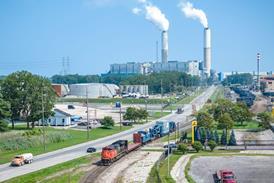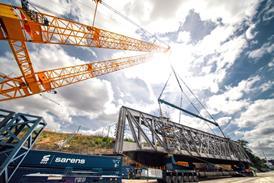HLPFI discusses the immediate impact of the Covid-19 coronavirus outbreak on the multipurpose shipping sector with AAL Shipping’s managing director, Kyriacos Panayides.

“As forecasted, production and international cargo movements have declined rapidly since the start of the outbreak. Initially, the slowdown of imports and exports took hold in China, then South Korea and Japan – in all cases resulting in the forced reduction of shipments, delayed project cargo readiness and in many cases cargo bookings cancellations.
“Now the virus has taken hold in the rest of Asia, the Middle East, Europe and the USA, the same pattern of decline is happening worldwide. Cargo freight rates have also seen extreme downward pressure, with carriers facing fleet deployment at totally unsustainable levels,” Panayides explained.
“At AAL we have been closely monitoring global developments in relation to Covid-19 coronavirus and undertaken company-wide measures to ensure the health and safety of our people and the continuity of our shipping services and operations during this time and in the event of any regional escalation in threat,” he said. “Despite decisions being made at governmental level within each market worldwide, we want to be as prepared as possible with AAL’s own proactive set of business continuity plans.”
The company has adopted improved office hygiene and new daily health and safety procedures within the workplace; tailormade remote working/split working arrangements for AAL’s offices worldwide; meetings, business travel restrictions and quarantine directives; and deployed innovative and harmonised communications methodologies and cloud-based technology systems.
Internal working processes
“Most importantly, our significant investment over the last years in cloud technologies and internal working processes – that was harmonised across our operating platforms and global communications systems – is paying off, enabling our entire company to very efficiently move entire offices and functions to a remoting working system ensuring smooth operations in all areas,” added Panayides.
Right now, according to Panayides, the spread of Covid-19 worldwide is impacting major long-haul trade lanes. Although China is recovering, AAL is experiencing low demand from its major trading partners in Oceania, the Middle East, Europe and the USA.
Liquidity is also proving to be a major issue for the project logistics supply chain.
“So far, we have faced the freezing of receivables from Chinese accounts and severe liquidity issues all around us in the market. Nevertheless, AAL’s long-term focus on key accounts comprising majors in every industry sector – whose payment terms are set and stable – has mitigated our negative exposure. However, with the escalating pandemic surge in Europe and the USA, the effect is still unknown,” said Panayides.
“The most important measure that can be implemented at this time within any market is fiscal government support for corporate business and capital injection into economies. This is necessary to stimulate trade and cargo movement. Maritime transport is essential to the world's economy with over 90 percent of the world's trade carried on ships. Such policy is needed, more than ever, to get our industry and the wider global economy back on track.”
Any prediction on the long-term prospects for the multipurpose shipping sector is hard to make, given the current market upheaval, said Panayides. The short-term will remain pressurised and any recovery is dependent on containing the virus’ spread and fiscal support from governments and financial institutions. “Plus, of course, our leaders need to consider and deploy more relaxed international trading terms,” he noted.
“All being well, by Q3 2020 we could see more stability in global markets and trade emergence. By Q4 2020, there could be growth, as markets recover and start to refill their depleted stocks of goods, resources and commodities.
“Unfortunately, no one knows the exact timeline of recovery and, in this sense, unsupported companies within our sector across the board are in danger of serious repercussions and possible collapse as we witnessed even before this crisis.”
Unfortunately, no one knows the exact timeline of recovery and, in this sense, unsupported companies within our sector across the board are in danger of serious repercussions and possible collapse as we witnessed even before this crisis.
- Kyriacos Panayides, AAL
Coronavirus has tested business continuity systems to the extreme, brought about swift changes to the way in which people conduct their day-to-day business, and cast a microscope over the stability of international supply chains.
Panayides believes those logistics companies that have yet to make the switch to cloud-based communication and operating systems could fall foul of the present operating environment. “Organisations need investment and time resources to make the transition to innovative technological platforms and harmonise their systems, operations, protocols and training accordingly. Unfortunately, this highly challenging market does not support that,” he said.
On a more positive note, manufacturers of heavy, oversize and breakbulk cargoes had diversified their supply chains well ahead of the outbreak, mitigating some of the outbreak’s effects. “Supply chains have been changing and becoming more fluid for component manufacturing in sectors like energy, renewables, mining and infrastructure over the past two decades … large manufacturers, fabricators and EPCs – responsible for multi-billion-dollar projects – have stopped relying solely upon single source manufacturing points and suppliers.
“The recent trade tensions between the USA and China were a significant test of this diversification and flexibility in supply chain and sourcing. During this time, we saw manufacturing move from China to South East Asia,” Panayides explained. “As a shipping operator thathas served majors in the project cargo industry for 25 years, we work closely with project stakeholders to position our vessels on trade lanes that suit their changing geographic supply chain needs and we do it fast and efficiently.”
Still, as the pandemic forces the lockdown of many markets, the subsequent business and public upheaval fosters little appetite for investments and new project approvals. “Within the carrier sector too, there is no appetite for immediate fleet expansion and vessel charters with distressed ships sitting idle worldwide and unemployed.”
















